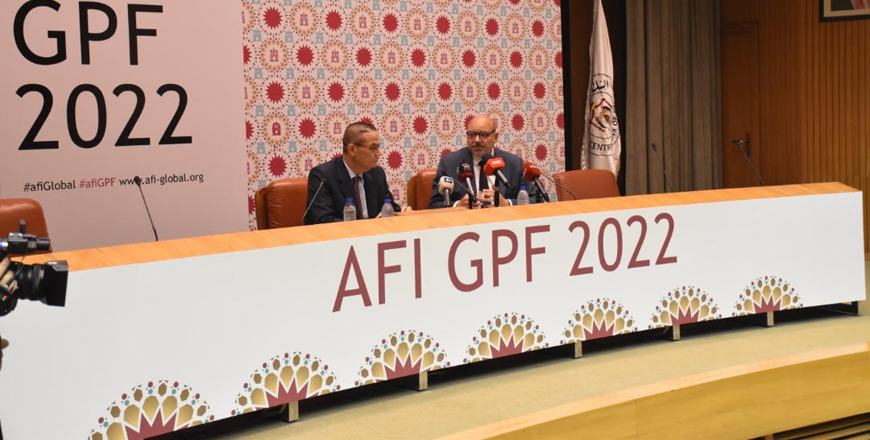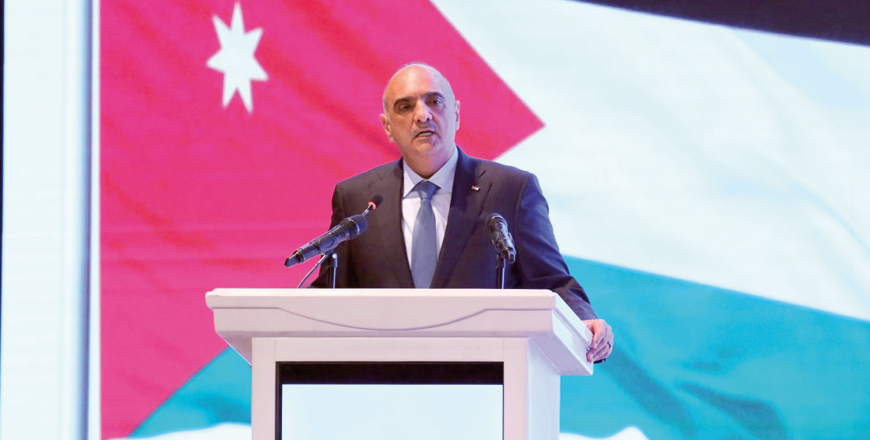You are here
World’s largest financial inclusion forum to commence at Dead Sea September 5
By Batool Ghaith - Sep 04,2022 - Last updated at Sep 04,2022

Central Bank Governor Adel Al Sharkas and Alliance for Financial Inclusion Executive Director Alfred Hannig (right) during a press conference on Sunday (Photo courtesy of CBJ)
AMMAN — The Central Bank of Jordan (CBJ) and the Alliance for Financial Inclusion (AFI) will co-host the world’s largest financial inclusion forum, the 2022 AFI Global Policy Forum (GPF), at the Dead Sea from September 5 to 8. This iteration will be the forum’s first return after the pandemic.
Under the patronage of His Majesty King Abdullah, more than 600 global policy makers, regulatory institutions, private sector representatives, international stakeholders and development partners from approximately 80 countries will gather at the Dead Sea for the GPF under the theme “Moving forward together: Towards a resilient, inclusive and sustainable future”, according to a CBJ statement
Prior to the forum, there will be a series of closed meetings exclusively for AFI members, including the gatherings of AFI working groups, regional initiatives, as well as the AFI annual general meeting, the statement said.
The 2022 GPF will highlight proven financial inclusion policy solutions beyond the pandemic, as deliberations will address how central bankers and other financial regulators, in addition to monetary and financial stability objectives, can enhance financial inclusion, in addition to underlining the role of financial inclusion in ensuring resilient and sustainable economic recovery, rebuilding and growth, according to the announcement.
CBJ Governor Adel Al Sharkas, during a press conference, expressed his pride in hosting the GPF in cooperation with the AFI, noting that it emphasises the Kingdom’s pivotal role in financial inclusion.
“It is a timely opportunity for us here in Jordan to showcase and share our ongoing and rigorous efforts towards financial inclusion, and to learn from the AFI network’s abundant and diverse experiences in implementing sustainable and pioneering financial inclusion policies,” Sharkas said.
He highlighted the importance of financial inclusion for economic growth and for SMEs, especially since most businesses in Jordan are SMEs and they play a “huge role” in economic growth, according to Sharkas.
“Empowering women and engaging youth in financial inclusion will enable them to contribute to economic growth too. The new strategy… will be inclusive of all the basic objectives such as the gender gap, youth… etc and we will also add new goals to work on,” Sharkas indicated.
According to Sharkas, the new strategy will work on green finance using a national strategy from the CBJ in cooperation with the World Bank, as well as financial coverage, insurance sector, savings, and financial awareness.
Sharkas noted that Jordan is a “success story” in financial inclusion, as it is the first country in the region which worked on financial inclusion.
He also emphasised the importance of cyber security in the national financial system, stating that “there is a specialised unit for cyber security at the CBJ which includes the entire banking system and is part of the national system for cyber security.”
Alfred Hannig, the executive director of the AFI, emphasised Jordan’s professionalism and ongoing dedication to being an international key player, especially after the pandemic.
“Moving forward and expanding greater financial inclusion can only be done together, as we face similar challenges and develop common solutions. The GPF offers enlightening, focused, and practical conversations to set the course of financial inclusion for the next decade,” Hannig said.
According to Hannig, the GPF will discuss solutions for financial inclusion beyond the pandemic, as most countries suffered during the pandemic. Therefore, said Hannig, this will not only mitigate the pandemic’s impact, but also prepare for the restoration of economies, in addition to highlighting the future role of central banking.
Hannig added that the forum will focus on regulating digital financial services, and how to keep the risks of technology in check regarding issues such as cyber security, data privacy, identity thefts and SME finance.
He also mentioned that inclusive, green finance is important for sustainable financial inclusion because it mitigates the impact of climate change.
The statement indicated that the AFI Global Policy Forum will highlight the four pillars of financial inclusion: Livelihood, sustainability, society and innovation. Against the backdrop of the four pillars, participants will look to the next 10 years as economies rebuild after the shocks caused by the pandemic.
Related Articles
AMMAN — Under the patronage of His Majesty King Abdullah, the Alliance for Financial Inclusion (AFI)’s 2022 Global Policy Forum (GPF) kicked
AMMAN — Central Bank of Jordan (CBJ) Deputy Governor Adel Sharkas on Sunday headed a session at the 2018 Arab banking conference, which was
AMMAN — Over 100 policymakers and regulators from around the globe on Monday gathered in Amman for the inauguration of the Financial Technol

















